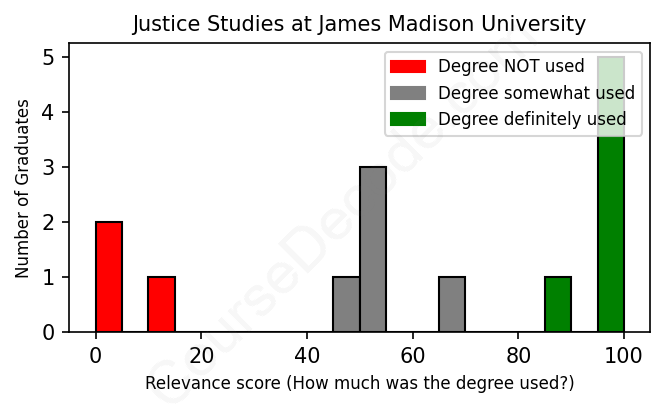
First, some facts. Of the Justice Studies graduates from James Madison University we've analyzed , here's how many have used (or NOT used) their degree in their career:

These are estimates based on AI analysis of 14 LinkedIn profiles (see below).
The verdict? Slightly below average. Overall, with an average relevance score of 62%, Justice Studies graduates from James Madison University have a slightly lower likelihood (-5%) of finding work in this field compared to the average graduate across all fields:
And for comparison, here's the chart for all profiles we've looked at across all degrees.
Also, after graduating, 42% of these graduates have pursued further education other than another Bachelor's degree (such as a Masters degree or other), compared to the average across all profiles of 35%. This suggests you may need more than just a Bachelors degree to be competitive as a Justice Studies graduate.
See the details:
|
Relevance score: 54% We think this person has gone into a career only somewhat relevant to their degree. We think this person has gone into a career only somewhat relevant to their degree.
DEGREE INFOGraduated in 2017 from James Madison University with a Bachelor of Arts (B.A.) in Justice Studies. Also pursued further education since (see below). JOB HISTORY SINCE GRADUATIONMember Representative Tufts Health Plan Sep 2017 - Sep 2018 Resource Specialist  Home Base, a Red Sox Foundation and Massachusetts General Hospital Program Sep 2018 - Dec 2018 Bartender  Cheeky Monkey Brewing Co. May 2018 - Jul 2019 Summer Fellow  Wendy Murphy Law May 2021 - Sep 2021 Conference Services Assistant  Skadden, Arps, Slate, Meagher & Flom LLP and Affiliates Apr 2019 - May 2023 Intern  Ramirez & Sunnerberg, LLC May 2023 - Present FURTHER DEGREES DONE SINCE GRADUATINGJuris DoctorNew England Law | Boston 2020 - 2024 ABOUTPending admission to the Massachusetts Bar. Currently working for criminal defense firm Ramirez & Sunnerberg as an SJC 3:03 Certified Student Practitioner. In this role I continue to gain valuable experience writing motions, conducting client interviews, and assisting in trials for indigent clients assigned by CPCS. |
The top 10 most common jobs done by the graduates we've analyzed (ranked most common to least) are:
When looking at the career paths of graduates from James Madison University's Justice Studies program, it's clear that many have pursued legally-focused roles. The most common jobs include positions like paralegals, attorneys, legal assistants, and judicial externs. These roles are typically very relevant to the education received in Justice Studies, as they involve direct engagement with the legal system and apply the principles of justice and legal procedures that students study in their program. For instance, roles within law firms, like those of Associate Attorney or Legal Assistant, demonstrate a clear connection between their degree and their job responsibilities, making them ideal matches for the skills learned in school.
However, not all graduates have taken careers closely related to Justice Studies. Some have ventured into sales, operations, and roles in various other sectors that don’t utilize their degree in a meaningful way. Positions such as Sales Representative or Operations Manager largely focus on skills that are not specific to justice or legal studies. Consequently, while many graduates are thriving in legal careers that leverage their expertise, others have found themselves in jobs that have a more tenuous connection to their degree, indicating a mixed relationship between the education they received and their subsequent job placement.
Here is a visual representation of the most common words in job titles for Justice Studies graduates (this is across all Justice Studies graduates we've analyzed, not just those who went to James Madison University):

Looking at the career trajectories of graduates from James Madison University with a degree in Justice Studies, it’s clear that many have found themselves in roles related to the legal and justice fields shortly after graduation. For instance, several alumni have started off as paralegals, legal assistants, and case managers, indicating a strong initial push toward legal careers. For example, a 2011 graduate has had a steady climb in the legal sector, moving from externships to being a partner at a law firm within a decade. This suggests that graduates often leverage internships and entry-level legal positions to build their careers.
However, not all paths have been as directly aligned with Justice Studies. Some graduates have ventured into unrelated fields such as sales or operations management, showing a broader interpretation of career possibilities. Over time, we see that a substantial portion remains in law enforcement or legal roles, like probation officers and police officers, which are very relevant to their studies. That said, there are also those who have drifted into completely different industries, showing a mixed bag of outcomes. Overall, while many graduates seem to carve successful careers within the justice system, others have navigated away from these paths altogether, ending up in various sectors that might not relate closely to their degree. It highlights how flexible a Justice Studies degree can be, but also illustrates that not all journeys lead back to the courtroom or law enforcement blocks.
Getting a Bachelor’s degree in Justice Studies at James Madison University, or anywhere really, can be a mixed bag in terms of difficulty. It’s not considered one of the hardest majors out there, especially when compared to something like engineering or hard science. You’ll deal with a fair amount of reading, writing, and some theory, but if you’re interested in social justice, law, or criminology, it can be pretty engaging. Plus, the professors are usually approachable and really want to help you understand the material, which can make a difference. Overall, it’s more about staying on top of your work and being genuinely interested in the subject; if you're into it, you’ll probably find it manageable!
Most commonly, in the LinkedIn profiles we've looked at, it takes people 4 years to finish a Bachelor degree in Justice Studies.
Looking at these JMU justice studies grads, it seems like some of them are definitely making decent money, while others are still figuring it out. For example, grads who went the legal route, like the one who became a partner at a law firm, probably saw their earnings climb pretty high, especially as they snagged those roles. On the flip side, some graduates took jobs in areas like brewing or general operations, which can vary widely in pay. Overall, if they stuck to paths related to law or intelligence, they’re likely doing pretty well, but for those in sales or entry-level positions, the paycheck might be a bit tighter. It’s a mixed bag, but it’s clear that a strategic choice in career path can make a big difference when it comes to salary!
Here is a visual representation of the most common words seen in the "about" section of LinkedIn profiles who have a Bachelor degree in Justice Studies (this is across all Justice Studies graduates we've analyzed, not just those who went to James Madison University). This may or may not be useful:

Here are all colleges offering a Bachelor degree in Justice Studies (ordered by the average relevance score of their Justice Studies graduates, best to worst) where we have analyzed at least 10 of their graduates:
| College | Score | Count |
|---|---|---|
 San Jose State University San Jose State University
|
77 | 12 |
 James Madison University James Madison University
|
62 | 14 |
 Arizona State University Arizona State University
|
58 | 11 |